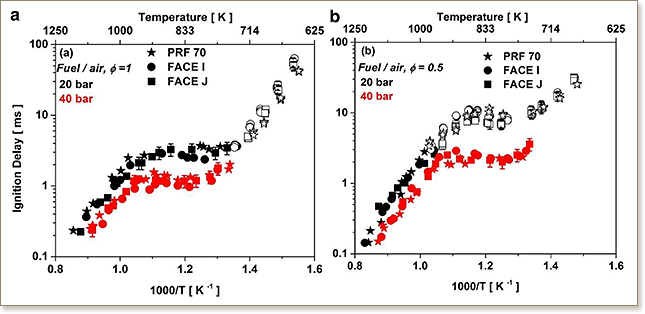Ignition studies of two low-octane gasolines


Low-octane gasolines (RON ∼ 50–70 range) are prospective fuels for gasoline compression ignition (GCI) internal combustion engines. GCI technology utilizing low-octane fuels has the potential to significantly improve well-to-wheel efficiency and reduce the transportation sector's environmental footprint by offsetting diesel fuel usage in compression ignition engines. In this study, ignition delay times of two low-octane FACE (Fuels for Advanced Combustion Engines) gasolines, FACE I and FACE J, were measured in a shock tube and a rapid compression machine over a broad range of engine-relevant conditions (650–1200 K, 20 and 40 bar and ϕ = 0.5 and 1). The two gasolines are of similar octane ratings with anti-knock index, AKI = (RON + MON)/2, of ∼ 70 and sensitivity, S = RON–MON, of ∼ 3. However, the molecular compositions of the two gasolines are notably different. Experimental ignition delay time results showed that the two gasolines exhibited similar reactivity over a wide range of test conditions. Furthermore, ignition delay times of a primary reference fuel (PRF) surrogate (n-heptane/iso-octane blend), having the same AKI as the FACE gasolines, captured the ignition behavior of these gasolines with some minor discrepancies at low temperatures (T < 700 K). Multi-component surrogates, formulated by matching the octane ratings and compositions of the two gasolines, emulated the autoignition behavior of gasolines from high to low temperatures. Homogeneous charge compression ignition (HCCI) engine simulations were used to show that the PRF and multi-component surrogates exhibited similar combustion phasing over a wide range of engine operating conditions.
DOI: 10.1016/j.combustflame.2017.07.006

"KAUST shall be a beacon for peace, hope and reconciliation, and shall serve the people of the Kingdom and the world."
King Abdullah bin Abdulaziz Al Saud, 1924 – 2015
Thuwal 23955-6900, Kingdom of Saudi Arabia
© King Abdullah University of Science and Technology. All rights reserved